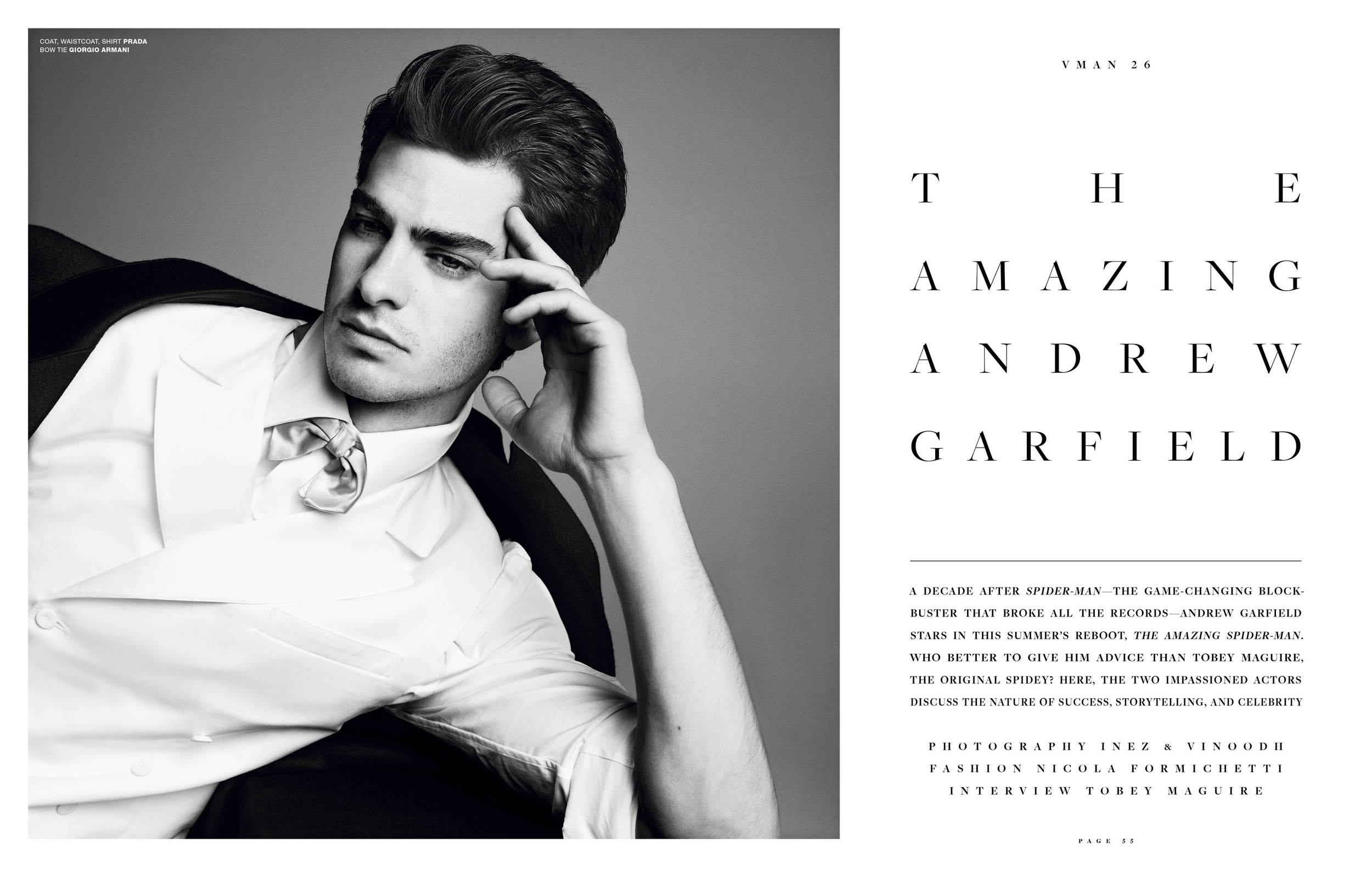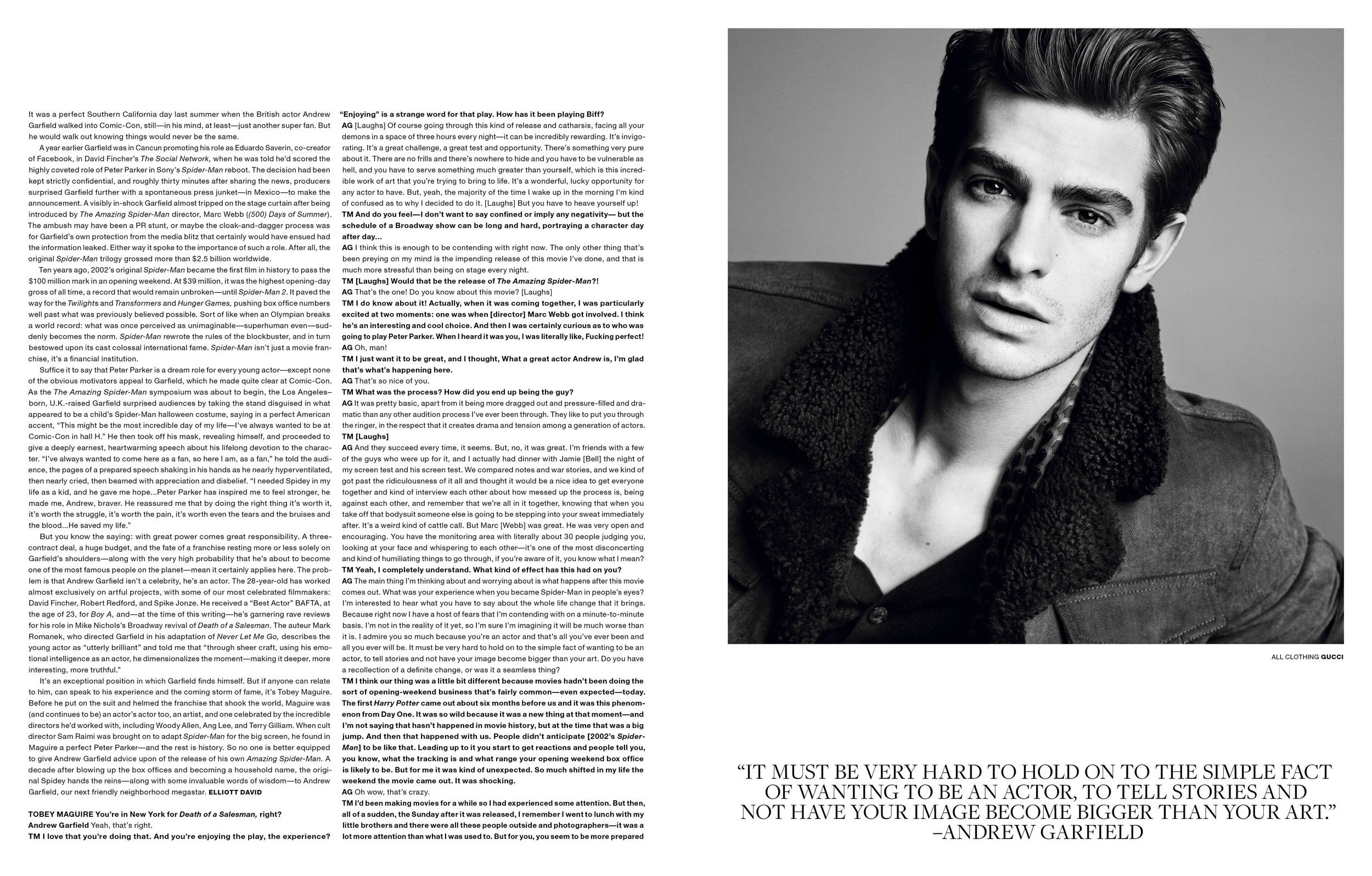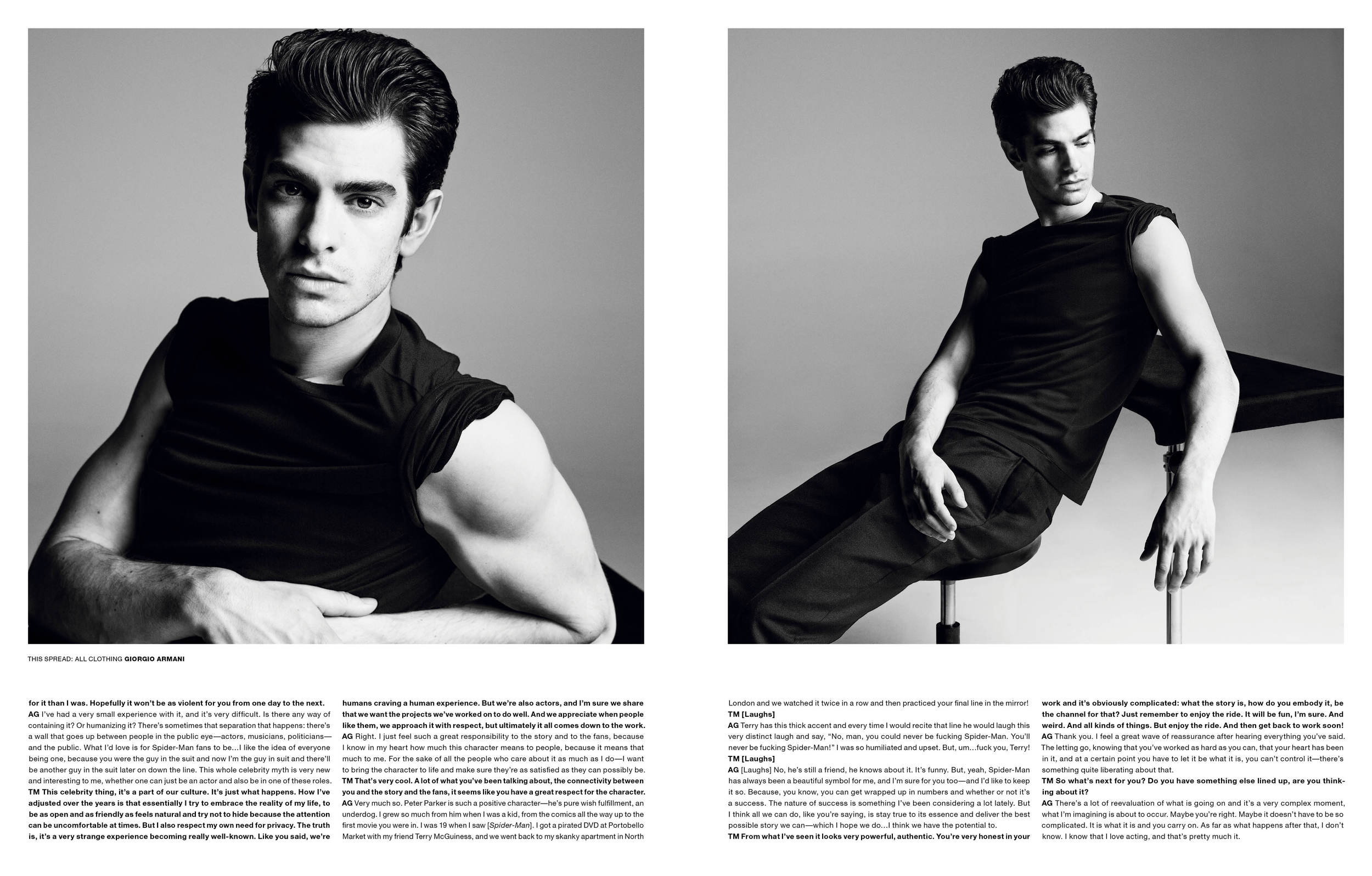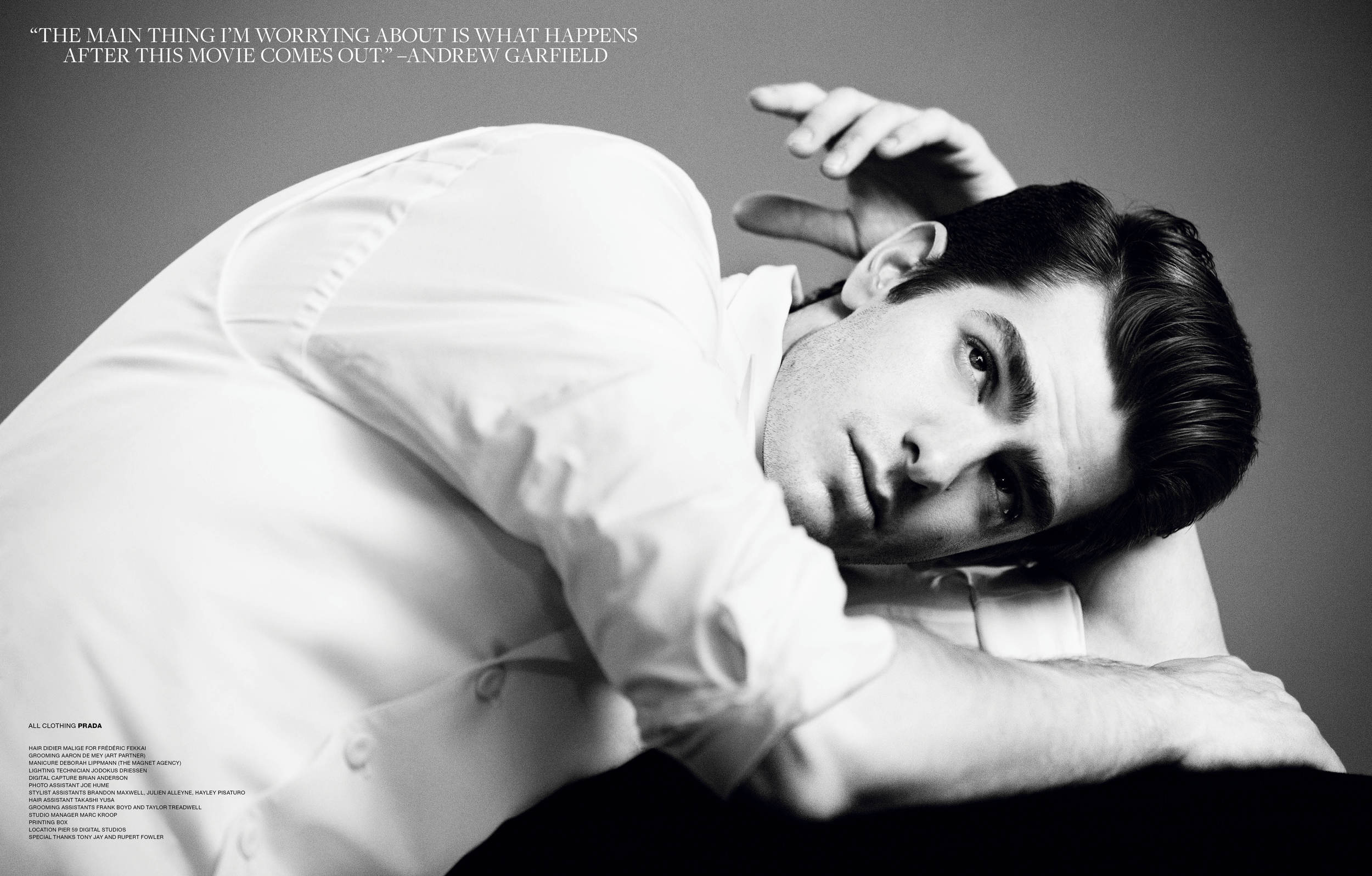Elliott W. David
INTERVIEWS AND SUCH
Index
EIC of VMAN26, booked Garfield for the cover, asked Tobey Maguire to do the interview as a passing of the torch.




PHOTOGRAPHY INEZ & VINOODH
FASHION NICOLA FORMICHETTI
TEXT ELLIOTT DAVID
INTERVIEW TOBEY MAGUIRE
A DECADE AFTER SPIDER-MAN—THE GAME-CHANGING BLOCKBUSTER THAT BROKE ALL THE RECORDS—ANDREW GARFIELD STARS IN THIS SUMMER’S REBOOT, THE AMAZING SPIDER-MAN. WHO BETTER TO GIVE HIM ADVICE THAN TOBEY MAGUIRE, THE ORIGINAL SPIDEY? HERE, THE TWO IMPASSIONED ACTORS DISCUSS THE NATURE OF SUCCESS, STORYTELLING, AND CELEBRITY
It was a perfect Southern California day last summer when the British actor Andrew Garfield walked into Comic-Con, still—in his mind, at least—just another super fan. But he knew that when he walked out, his life would never be the same.
A year earlier Garfield was in Cancun promoting his role as Eduardo Saverin, co-creator of Facebook, in David Fincher's The Social Network, when he was told he'd scored the highly coveted role of Peter Parker in Sony's Spider-Man reboot. The decision had been kept strictly confidential, and roughly thirty minutes after sharing the news, producers surprised Garfield further with a spontaneous press junket—in Mexico—to make the announcement. A visibly in-shock Garfield almost tripped on the stage curtain after being introduced by The Amazing Spider-Mandirector, Marc Webb ((500) Days of Summer). The ambush may have been a PR stunt, or maybe the cloak-and-dagger process was for Garfield's own protection from the media blitz that certainly would have ensued had the information leaked. Either way it spoke to the importance of such a role. After all, the original Spider-Man trilogy grossed more than $2.5 billion worldwide.
Ten years ago, 2002's original Spider-Man became the first film in history to pass the $100 million mark in an opening weekend. At $39 million, it was the highest opening-day gross of all time, a record that would remain unbroken—untilSpider-Man 2. It paved the way for the Twilights and Transformers and Hunger Games, pushing box office numbers well past what was previously believed possible. Sort of like when an Olympian breaks a world record: what was once perceived as unimaginable—superhuman even—sud- denly becomes the norm. Spider-Man rewrote the rules of the blockbuster, and in turn bestowed upon its cast colossal international fame. Spider-Man isn't just a movie franchise, it's a financial institution.
Suffice it to say that Peter Parker is a dream role for every young actor—except none of the obvious motivators appeal to Garfield, which he made quite clear at Comic-Con. As the The Amazing Spider-Man symposium was about to begin, the Los Angeles– born, U.K.-raised Garfield surprised audiences by taking the stand disguised in what appeared to be a child's Spider-Man halloween costume, saying in a perfect American accent, "This might be the most incredible day of my life—I've always wanted to be at Comic-Con in hall H." He then took off his mask, revealing himself, and proceeded to give a deeply earnest, heartwarming speech about his lifelong devotion to the charac ter. "I've always wanted to come here as a fan, so here I am, as a fan," he told the audi- ence, the pages of a prepared speech shaking in his hands as he nearly hyperventilated, then nearly cried, then beamed with appreciation and disbelief. "I needed Spidey in my life as a kid, and he gave me hope...Peter Parker has inspired me to feel stronger, he made me, Andrew, braver. He reassured me that by doing the right thing it's worth it, it's worth the struggle, it's worth the pain, it's worth even the tears and the bruises and the blood...He saved my life."
But you know the saying: with great power comes great responsibility. A three- contract deal, a huge budget, and the fate of a franchise resting more or less solely on Garfield's shoulders—along with the very high probability that he's about to become one of the most famous people on the planet—mean it certainly applies here. The problem is that Andrew Garfield isn't a celebrity, he's an actor. The 28-year-old has worked almost exclusively on artful projects, with some of our most celebrated filmmakers: David Fincher, Robert Redford, and Spike Jonze. He received a "Best Actor" BAFTA, at the age of 23, for Boy A, and—at the time of this writing—he's garnering rave reviews for his role in Mike Nichols's Broadway revival of Death of a Salesman. The auteur Mark Romanek, who directed Garfield in his adaptation of Never Let Me Go, describes the young actor as "utterly brilliant" and told me that "through sheer craft, using his emo- tional intelligence as an actor, he dimensionalizes the moment—making it deeper, more interesting, more truthful."
It's an exceptional position in which Garfield finds himself. But if anyone can relate to him, can speak to his experience and the coming storm of fame, it's Tobey Maguire. Before he put on the suit and helmed the franchise that shook the world, Maguire was (and continues to be) an actor's actor too, an artist, and one celebrated by the incredible directors he'd worked with, including Woody Allen, Ang Lee, and Terry Gilliam. When cult director Sam Raimi was brought on to adapt Spider-Man for the big screen, he found in Maguire a perfect Peter Parker—and the rest is history. So no one is better equipped to give Andrew Garfield advice upon of the release of his own Amazing Spider-Man. A decade after blowing up the box offices and becoming a household name, the origi- nal Spidey hands the reins—along with some invaluable words of wisdom—to Andrew Garfield, our next friendly neighborhood megastar.
TOBEY MAGUIRE You're in New york for Death of a Salesman, right?
ANDREW GARFIELD Yeah, that's right.
TM I love that you're doing that. and you're enjoying the play, the experience? "Enjoying" is a strange word for that play. How has it been playing Biff?
AG [Laughs] Of course going through this kind of release and catharsis, facing all your demons in a space of three hours every night—it can be incredibly rewarding. It's invigo- rating. It's a great challenge, a great test and opportunity. There's something very pure about it. There are no frills and there's nowhere to hide and you have to be vulnerable as hell, and you have to serve something much greater than yourself, which is this incred- ible work of art that you're trying to bring to life. It's a wonderful, lucky opportunity for any actor to have. But, yeah, the majority of the time I wake up in the morning I'm kind of confused as to why I decided to do it. [Laughs] But you have to heave yourself up!
TM And do you feel—I don't want to say confined or imply any negativity— but the schedule of a broadway show can be long and hard, portraying a character day after day.
AG I think this is enough to be contending with right now. The only other thing that's been preying on my mind is the impending release of this movie I've done, and that is much more stressful than being on stage every night.
TM [Laughs] Would that be the release of The Amazing Spider-Man?!
AG That's the one! Do you know about this movie? [Laughs]
TM I do know about it! actually, when it was coming together, I was particularly excited at two moments: one was when [director] Marc Webb got involved. I think he's an interesting and cool choice. and then I was certainly curious as to who was going to play Peter Parker. When I heard it was you, I was literally like, Fucking perfect!
AG Oh, man!
TM I just want it to be great, and I thought, What a great actor andrew is, i'm glad that's what's happening here.
AG That's so nice of you.
TM What was the process? How did you end up being the guy?
AG It was pretty basic, apart from it being more dragged out and pressure-filled and dra- matic than any other audition process I've ever been through. They like to put you through the ringer, in the respect that it creates drama and tension among a generation of actors.
TM [Laughs]
AG And they succeed every time, it seems. But, no, it was great. I'm friends with a few of the guys who were up for it, and I actually had dinner with Jamie [Bell] the night of my screen test and his screen test. We compared notes and war stories, and we kind of got past the ridiculousness of it all and thought it would be a nice idea to get everyone together and kind of interview each other about how messed up the process is, being against each other, and remember that we're all in it together, knowing that when you take off that bodysuit someone else is going to be stepping into your sweat immediately after. It's a weird kind of cattle call. But Marc [Webb] was great. He was very open and encouraging. You have the monitoring area with literally about 30 people judging you, looking at your face and whispering to each other—it's one of the most disconcerting and kind of humiliating things to go through, if you're aware of it, you know what I mean?
TM Yeah, I completely understand. What kind of effect has this had on you?
AG The main thing I'm thinking about and worrying about is what happens after this movie comes out. What was your experience when you became Spider-Man in people's eyes? I'm interested to hear what you have to say about the whole life change that it brings. Because right now I have a host of fears that I'm contending with on a minute-to-minute basis. I'm not in the reality of it yet, so I'm sure I'm imagining it will be much worse than it is. I admire you so much because you're an actor and that's all you've ever been and all you ever will be. It must be very hard to hold on to the simple fact of wanting to be an actor, to tell stories and not have your image become bigger than your art. Do you have a recollection of a definite change, or was it a seamless thing?
TM I think our thing was a little bit different because movies hadn't been doing the sort of opening-weekend business that's fairly common—even expected—today. The first Harry Potter came out about six months before us and it was this phenom- enon from Day one. it was so wild because it was a new thing at that moment—and i'm not saying that hasn't happened in movie history, but at the time that was a big jump. and then that happened with us. People didn't anticipate [2002's Spider- Man] to be like that. Leading up to it you start to get reactions and people tell you, you know, what the tracking is and what range your opening weekend box office is likely to be. but for me it was kind of unexpected. So much shifted in my life the weekend the movie came out. it was shocking.
AG Oh wow, that's crazy.
TM I'd been making movies for a while so I had experienced some attention. But then, all of a sudden, the Sunday after it was released, I remember I went to lunch with my little brothers and there were all these people outside and photographers—it was a lot more attention than what I was used to. But for you, you seem to be more prepared for it than I was. Hopefully it won't be as violent for you from one day to the next.
AG I've had a very small experience with it, and it's very difficult. is there any way of containing it? Or humanizing it? There's sometimes that separation that happens: there's a wall that goes up between people in the public eye—actors, musicians, politicians— and the public. What I'd love is that [whoever plays Spider-Man next] is a Spider-Man fan, because you were the guy in the suit and now i'm the guy in suit and there'll be another guy in the suit later on down the line. this whole celebrity myth is very new and interesting to me, whether one can just be an actor and also be in one of these roles.
TM This celebrity thing, it's a part of our culture. It's just what happens. How I've adjusted over the years is that essentially I try to embrace the reality of my life, to be as open and as friendly as feels natural and try not to hide because the attention can be uncomfortable at times. But I also respect my own need for privacy. The truth is, it's a very strange experience becoming really well-known. Like you said, we're humans craving a human experience. But we're also actors, and I'm sure we share that we want the projects we've worked on to do well. And we appreciate when people like them, we approach it with respect, but ultimately it all comes down to the work.
AG Right. I just feel such a great responsibility to the story and to the fans, because I know in my heart how much this character means to people, because it means that much to me. For the sake of all the people who care about it as much as I do—I want to bring the character to life and make sure they're as satisfied as they can possibly be.
TM That's very cool. A lot of what you've been talking about, the connectivity between you and the story and the fans, it seems like you have a great respect for the character.
AG Very much so. Peter Parker is such a positive character—he's pure wish fulfillment, an underdog. I grew so much from him when I was a kid, from the comics all the way up to the first movie you were in. I was 19 when I saw [Spider-Man]. I got a pirated dvd at portobello Market with my friend terry Mcguiness, and we went back to my skanky apartment in North London and we watched it twice in a row and then practiced your final line in the mirror!
TM [Laughs]
AG Terry has this thick accent and every time I would recite that line he would laugh this very distinct laugh and say, "No, man, you could never be fucking Spider-Man. You'll never be fucking Spider-Man!" I was so humiliated and upset. But, um...fuck you, Terry!
TM [Laughs]
AG [Laughs] No, he's still a friend, he knows about it. It's funny. But, yeah, Spider-Man has always been a beautiful symbol for me, and I'm sure for you too—and I'd like to keep it so. Because, you know, you can get wrapped up in numbers and whether or not it's a success. The nature of success is something I've been considering a lot lately. But I think all we can do, like you're saying, is stay true to its essence and deliver the best possible story we can—which I hope we do...I think we have the potential to.
TM From what I've seen it looks very powerful, authentic. You're very honest in your work and it's obviously complicated: what the story is, how do you embody it, be the channel for that? Just remember to enjoy the ride. It will be fun, I'm sure. And weird. And all kinds of things. But enjoy the ride. And then get back to work soon!
AG Thank you. I feel a great wave of reassurance after hearing everything you've said. The letting go, knowing that you've worked as hard as you can, that your heart has been in it, and at a certain point you have to let it be what it is, you can't control it—there's something quite liberating about that.
TM So what's next for you? Do you have something else lined up, are you thinking about it?
AG There's a lot of reevaluation of what is going on and it's a very complex moment, what I'm imagining is about to occur. Maybe you're right. Maybe it doesn't have to be so complicated. It is what it is and you carry on. As far as what happens after that, I don't know. I know that I love acting, and that's pretty much it.